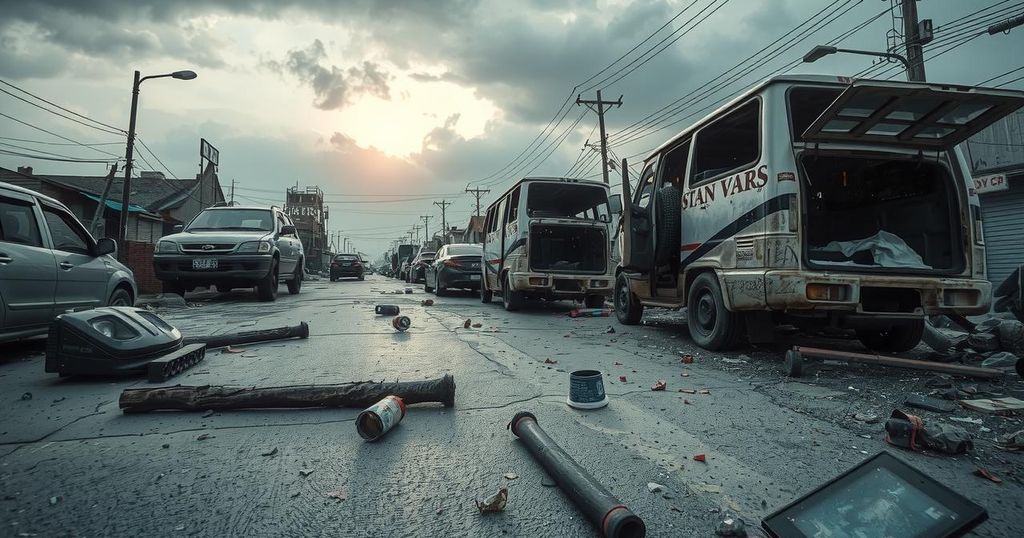Renewed Conflict in the DRC: A Surge in Violence and Its Global Implications

The DRC faces renewed conflict as rebel group M23 expands its territory, capturing Goma and threatening to move towards Kinshasa. The UN warns of escalating violence and humanitarian crises, with significant implications for global mineral supplies. International responses remain subdued, raising questions about geopolitical stability in Central Africa.
The Democratic Republic of Congo (DRC) is experiencing a severe resurgence of conflict, predominantly due to the rebel group M23’s aggressive maneuvers, aiming to consolidate its control by advancing southward from Goma. The United Nations has expressed concerns that this conflict, which has lingered for over three decades, may escalate into a larger regional war. M23’s recent capture of Goma marks a critical juncture as its leader announces intentions to reach the capital, Kinshasa, prompting a call for mobilization from the Congolese government, led by President Félix Tshisekedi.
For years, violence has plagued the DRC, exacerbated by the M23’s rising influence. The insurgency, which has resulted in over 400,000 displacements just last month, has drawn international attention, especially due to the fatality of several UN peacekeepers. The DRC has a troubled history, with millions affected by conflicts since independence, and this resurgence threatens not only local stability but also broader international interests.
M23, primarily composed of ethnic Tutsis, arose from a complex backdrop of historical tensions, particularly interfacing with Rwanda, which has denied allegations of direct military support. The rebel group claims the Congolese government has not sufficiently protected Tutsis, contradicting the DRC administration’s views on the insurgents’ motives. M23’s advances threaten to reclaim territories lost during two major wars that caused immense civilian suffering in the early 2000s.
The international community’s response has been tepid, with significant implications for geopolitical dynamics. International relations are tense, as exemplified by the uproar after the French embassy was attacked by demonstrators protesting inaction. Key international figures, including U.S. President Donald Trump, have recognized the crisis, yet the muted engagement from Western nations could provide openings for Russia and China in the region.
The DRC is globally significant due to its vast mineral wealth, particularly cobalt, which is vital for modern technology manufacturing. Currently, over 80% of the DRC’s cobalt production is owned by Chinese enterprises, emphasizing Beijing’s economic interest in the region. Regional conflict has hindered mining operations and raised alarms about potential impacts on global supply chains, though experts suggest a supply crisis is not imminent.
Rwanda’s involvement in the conflict raises further complexities. Past military incursions by M23 prompted significant international backlash leading to reduced aid to Rwanda, contrasting sharply with the current scenario where Western support remains crucially unchanged despite ongoing hostilities. While the German Development Ministry has chosen to sever dialogues with Rwanda, M23’s aggressive actions continue unabated, revealing a nuanced and potentially dangerous aspect of the conflict.
The Democratic Republic of Congo has been a theater of prolonged conflict, particularly influenced by the historical dynamics involving ethnic tensions and external interventions. Since gaining independence from Belgium in 1960, the country has navigated a tumultuous landscape of warfare, significantly exacerbated by the emergence of groups like M23, which capitalize on grievances surrounding ethnic protections. Understanding the backdrop of the DRC’s struggles is imperative to fully grasp the ongoing humanitarian crises and the potential for wider regional instability.
The situation in the DRC is dire, marked by the resurgence of M23’s insurgency, leading to significant humanitarian consequences and geopolitical implications. The international community’s reaction raises questions about future engagement and influence, especially as major economic interests in natural resources are at stake. Without a concerted response, the conflict is likely to deepen, perpetuating the cycle of violence and displacement in the region.
Original Source: www.nbcnews.com






